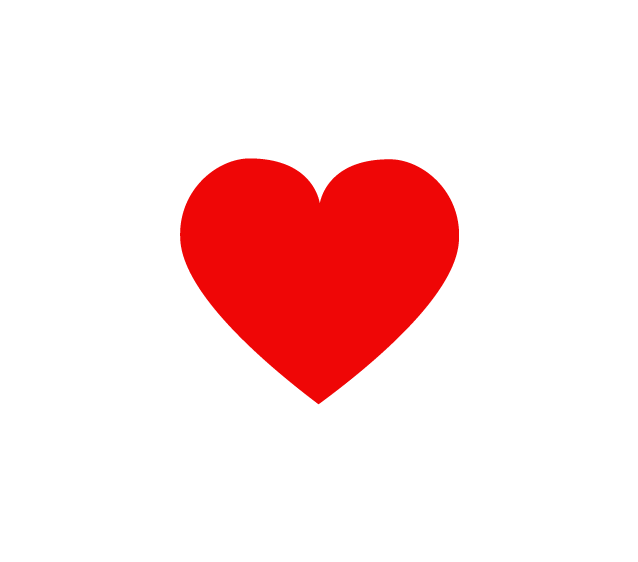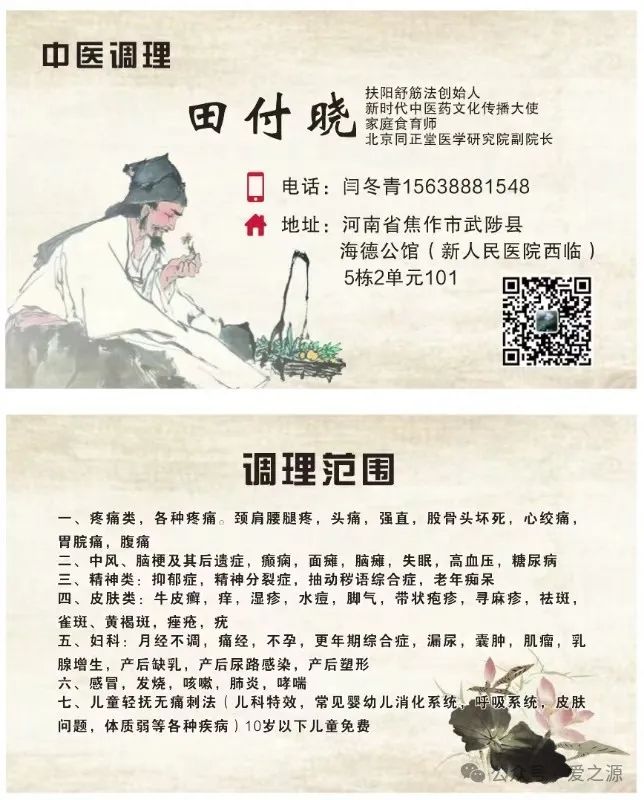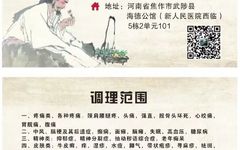
 Yin is cold, Yang is hot; Yin is blood, Yang is Qi; when Yin and Yang are balanced, all diseases disappear.
Yin is cold, Yang is hot; Yin is blood, Yang is Qi; when Yin and Yang are balanced, all diseases disappear.
A tree’s most important part is its roots. When the leaves turn yellow, it is difficult to find the cause from above. By looking down at the roots, one can easily understand whether it is due to overwatering, drought, pests, or the need for loosening the soil.
For a person, the most important aspect is Qi and blood. If a certain part of the body is uncomfortable, one should not only focus on that area but should look for the cause in the Qi and blood.
When Qi and blood are balanced, pain will naturally disappear. If one treats the head for a headache and the feet for foot pain without addressing the root cause of Qi and blood, one may find themselves exhausted from running around.
Why is this? Because Qi and blood are flowing, and diseases are also moving.
The purpose of health preservation is to seek balance in the body.
Consider the body as a bucket, diseases as the water in the bucket, and Qi and blood as the wooden planks that make up the bucket.
From birth to death, diseases lurk in our bodies, just like water in a bucket. What we need to do is keep the diseases hidden and not let them overflow.
The reason why long-lived individuals live long is that they keep their bucket full of water; those who die young have only a little water in their bucket, which leaks out.
Please note: the amount of water a bucket can hold is not determined by the longest plank but by the shortest one.
A person’s lifespan is not determined by the strongest part of their body but by the weakest part.
A sixty-year-old actor has been hospitalized for over three months, and his condition is severe. Initially, he only had trouble biting his tongue while eating, but it later developed into an inability to lift his arms above his head.
The hospital diagnosed him with myasthenia gravis. He has been tormented by illness to the point of being unrecognizable. His eyelids droop, and he sits weakly on the hospital bed, speaking with great difficulty, making it almost impossible to hear what he says.
His wife said, “His heart is very good; the doctor said he could live for another 50 years based on his heart alone; look at his blood pressure, it is also very normal.”
Upon carefully reviewing the health report, it is true that many of the actor’s indicators are very good, even better than many young people. However, the unfortunate reality is that the health of the body is not determined by those good indicators but by the worst one among them.
Upon taking his pulse, it was clear that the actor’s spleen and stomach were severely deficient, and the great Qi in his chest had begun to sink. The spleen and stomach are the foundation of postnatal health and the source of Qi and blood production. If the spleen and stomach are damaged, Qi and blood will be severely imbalanced; when Qi and blood are imbalanced, the wooden planks in the body will be uneven; when the planks are uneven, water will leak from the shorter plank. Unfortunately, it was as predicted, and not long after, we heard that the actor had passed away.
If 99% of a person’s body is healthy, but 1% has a serious problem, then that person’s health will be determined by that worst 1%.
The quality of health does not depend on how good the good parts are but on how bad the bad parts are. Therefore, the purpose of health preservation is to seek balance in the body, and the key to body balance is the balance of Qi and blood.
When Qi and blood are balanced, even if the healthy parts of the body are not very prominent, the unhealthy parts will improve. Thus, your weaknesses will become strengths.
When Yin and Yang are adjusted, all diseases will disappear.
In practice, I have encountered various patients. Some strong and robust patients appear to be in good health with no issues, but upon taking their pulse and examining their tongue, problems are revealed; their Qi and blood are extremely imbalanced. These individuals generally belong to the category of Yang excess and Yin deficiency.
One patient, in his fifties, is muscular and energetic. He claims he can swim 2000 meters in one go and play basketball without taking a break. One would think such a person is very healthy!
However, this is not the case, as what we see are his strengths, but his weaknesses remain hidden. Indeed, upon taking his pulse, it was found that he has Yin deficiency and excess heat, and upon inquiry, it was revealed that he has been suffering from diabetes for three years.
His weakness lies in the pancreas; if he does not find a way to strengthen this weakness, his strengths will be of no use, and his lifespan can be imagined.
We often see such individuals around us; they appear strong and healthy but suddenly fall ill and are hospitalized, only to leave this world shortly thereafter. Meanwhile, some people frequently visit hospitals, seemingly sick all over, yet live long lives.
The reason is that the former have long strengths and short weaknesses, while the latter have neither long strengths nor short weaknesses. When the body is balanced, longevity naturally follows.
When the Yin and Yang of heaven and earth are harmonious, all industries begin to prosper; when the Qi and blood of the human body are balanced, various diseases will gradually improve.
When the Qi and blood of the heart gradually balance, frequent palpitations and chest tightness will gradually disappear, and heart disease will slowly improve; when the Qi and blood of the stomach and intestines gradually balance, conditions like enteritis and gastric ulcers will also gradually improve; when the Qi and blood of the liver balance, liver diseases will gradually improve…
Therefore, Qi and blood are the center of health preservation, and balance is the purpose of Qi and blood. By balancing Qi and blood, weak individuals can achieve longevity; if Qi and blood are imbalanced, even a strong person may die suddenly.
Yin and Yang in the human body mainly manifest in two aspects: one is cold and heat, and the other is Qi and blood. Cold is Yin, heat is Yang; blood is Yin, Qi is Yang. Only when Yin and Yang are balanced can cold and heat be balanced, and Qi and blood flow smoothly. Thus, when Yin and Yang are adjusted, all diseases will disappear.
What is Qi?
Qi is the most fundamental element of life; everyone lives on a breath of Qi. Whether a person is sick can be determined by their complexion, which reflects the Qi and blood within the body.
Traditional Chinese Medicine speaks of observation diagnosis. What does observation diagnose? It observes the complexion. Qi is the manifestation of the body’s Qi on the surface; color is the manifestation of the body’s blood on the surface.
If a person’s Qi is about to disperse, it indicates that their life is nearing its end. The heavenly physician said: “The life and death of a person depend entirely on Qi; when Qi gathers, there is life; when Qi disperses, there is death.”
One day, I met a deeply skilled acupuncturist who said that to determine whether a person can be saved, it only takes one needle to know. He said: “If a person’s life state is stable, the needle goes in tightly; if a person is about to die, the needle goes in like it is going into tofu, loose and slack, indicating that their Qi is about to disperse and cannot gather together.” Therefore, the Nan Jing states: “Qi is the root of a person.”
In the human body, Qi, as described in the Nei Jing, is called “human Qi” and consists of three parts: first is the Da Zhou Tian prenatal Qi. This Qi mainly comes from the essence of the parents’ reproductive energy, also known as essence Qi, which is the root of all Qi, akin to the original shares in the stock market.
Second is the Xiao Zhou Tian postnatal Qi. This Qi mainly comes from food. All the food we eat contains the energy of Qi. For example, a red apple’s skin is the transformation of solar energy; a sweet potato’s yellow color is the transformation of earth’s Qi…
Traditional Chinese Medicine emphasizes the properties and meridians of medicines, and the same applies to food. What is the nature of food? It is the Qi of food. It is divided into four types, also known as the four Qi: cold, hot, warm, and cool. When people consume these foods containing the four Qi, they will transform the Qi in the food into the Qi in the body through the spleen and stomach, which is the great furnace, hence it is also called “grain Qi.”
Grain Qi is different from the prenatal essence Qi; grain Qi can be continuously supplied.
Another type of Qi comes from the clear Qi of nature, which is the external Da Zhou Tian Qi that relies on the lung’s breathing function and the kidney’s ability to absorb Qi to be inhaled into the body.
The clear Qi enters the human body with breathing and must not be interrupted. The Huang Di Nei Jing states: “Man is born of the earth and hangs his life on the heavens; when heaven and earth combine their Qi, it is called a person.” After inheriting essence Qi, a life is born, but can this life grow into an adult?
This depends on the weather and the earth’s Qi. People absorb earth’s Qi from grains and heavenly Qi from nature; only when the Qi of heaven and earth harmonizes within the human body can life grow.
Why is it said that life hangs on the heavens? Think about it: a person can live for ten days or half a month without eating the grains of the earth, but without breathing the air of the heavens, they may not live for even ten minutes. This is life hanging on the heavens.
What is blood?
What is blood?
If Qi is the root of life, then blood is the foundation of that root. The heavenly physician said: “Qi is the commander of blood, and blood is the mother of Qi.” Qi is Yang, active, and warming; blood is Yin, passive, and nourishing.
Qi and blood are like a loving couple; they are different yet interdependent, living together in the family of the body.
Qi, as the husband, determines the direction of the entire family, providing warmth and support like sunlight; during stormy nights, he stands up to shield his wife and children from the wind and rain.
Blood, as the wife, is like the moon, tender and affectionate, nurturing the family without complaint; when the husband encounters trouble, she unconditionally helps. Therefore, Qi cannot exist without blood, and blood cannot exist without Qi. Qi can generate blood, circulate blood, and control blood; blood can generate Qi, nourish Qi, and carry Qi.
A good family is based on harmonious relationships between spouses; a good body requires balanced Qi and blood. If the spouses are not harmonious, the family will face constant troubles; if Qi and blood are imbalanced, whether Qi deficiency or blood deficiency, various diseases will follow. The Huang Di Nei Jing states: “When Qi and blood are out of harmony, all diseases will arise.”
Is aging due to insufficient Qi and blood? Here are many methods to tonify Qi and blood.
Qi and blood are the foundation of life; the biggest difference between the living and the dead is Qi and blood. Do you see Qi and blood in the dead? No, right? It can be said without exaggeration that no one with insufficient Qi and blood will live long! The saying “to cut off Qi” indicates the death of an organism; without Qi, there is no life. So, is Qi important?
Insufficient Qi and blood refers to Qi deficiency and blood deficiency in Traditional Chinese Medicine. The result of insufficient Qi and blood will lead to the decline of organ functions, causing premature aging.
Qi deficiency leads to cold limbs, spontaneous sweating, dizziness, tinnitus, mental fatigue, weakness, palpitations, and stunted growth.
Blood deficiency can manifest as pale complexion, dry skin, withered hair, brittle nails, blurred vision, numbness in hands and feet, insomnia with vivid dreams, forgetfulness, and mental confusion.
If we compare the human body to a growing plant, Qi is sunlight, and blood is dew; both work together to help the body thrive. Once Qi and blood are insufficient, it will lead to a comprehensive collapse of bodily functions.
The relationship between Qi and blood is significant, interlinked, and inseparable. Therefore, when tonifying Qi, do not forget to tonify blood; when tonifying blood, do not forget to tonify Qi.
How to regulate insufficient Qi and blood in daily life?
1. Exercise regularly
Some people do not have a good habit of exercising and spend long periods sitting or being still. Lack of exercise can easily obstruct the normal flow of Qi and blood, so regular exercise can effectively promote smoother circulation of Qi and blood, which is particularly important for improving Qi stagnation and blood stasis.
2. Ensure adequate sleep
There is a saying: “Food supplementation is not as good as sleep supplementation.” Compared to dietary therapy, sleep therapy is more convenient and simple, so it is essential to maintain a good sleep habit.
Because from around 11 PM to 2 AM the next day is a crucial period for the metabolism and repair of various organ functions in the body. Only when the body is in a deep sleep state during this time can it better regulate the functions of the organs, which is also an important way to promote the generation of fresh blood. If one stays up late during this time, it will lead to the depletion of Qi and blood, eventually resulting in insufficient Qi and blood.
Please share this article to let more people see it. Promote Traditional Chinese Medicine cultureSpread knowledge of Traditional Chinese MedicineLet us practice together
Promote Traditional Chinese Medicine cultureSpread knowledge of Traditional Chinese MedicineLet us practice together





